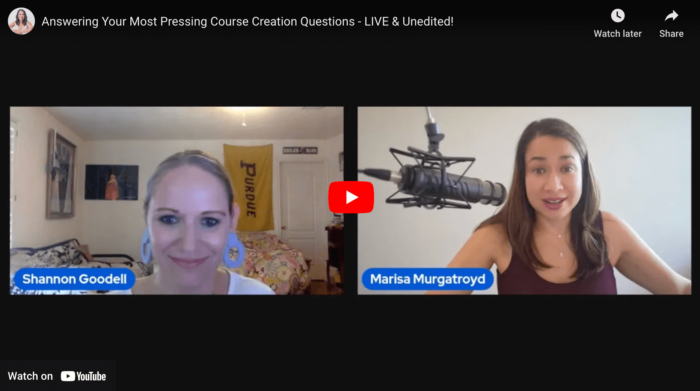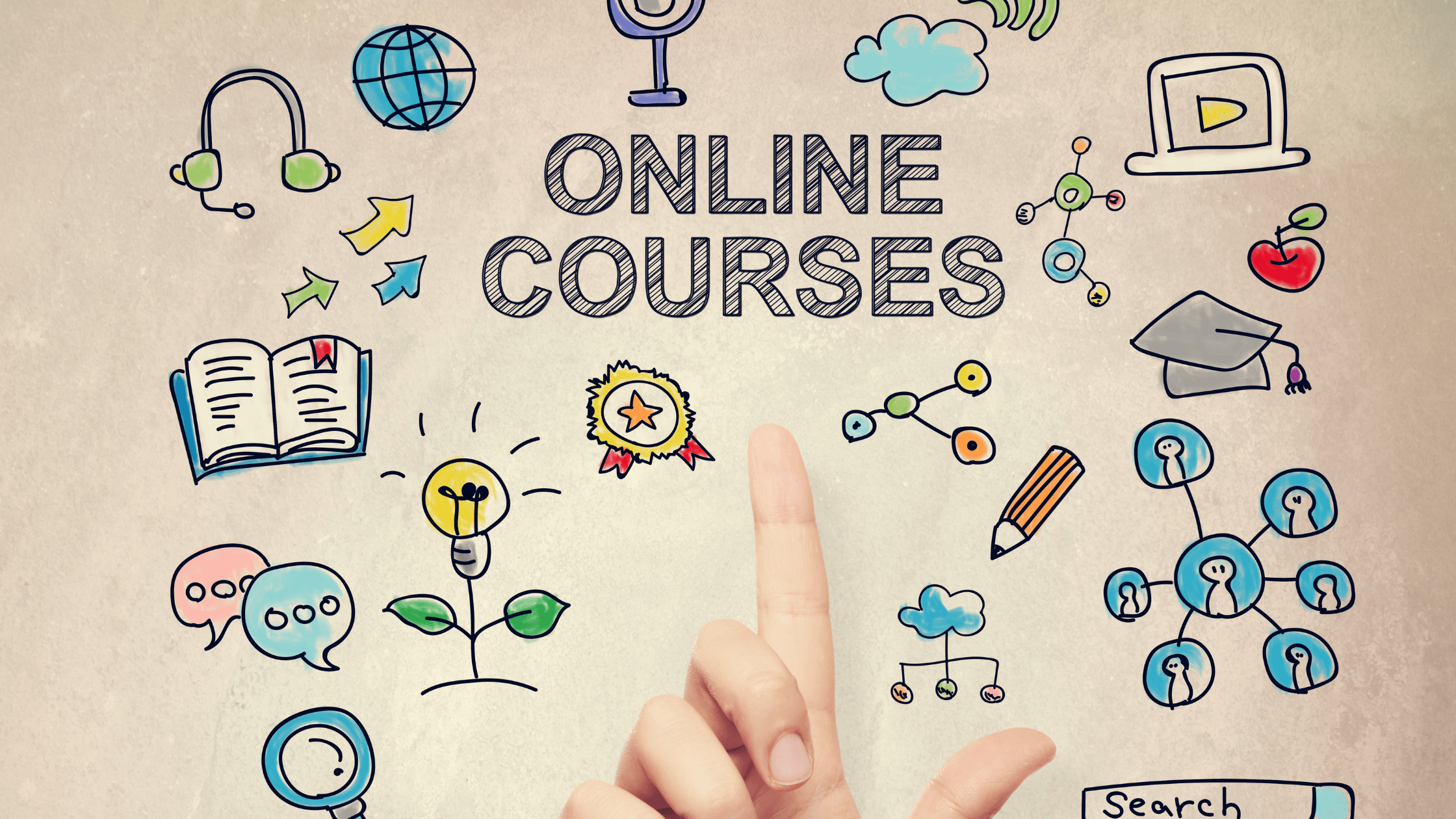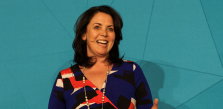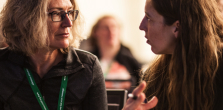I answered the most pressing questions about creating and launching an online course that’s successful NOW and in the future! Hope this replay helps you in your course creation journey. 🙂
Read the transcript below:
Hey, it looks like we’re live. Hey, everyone, let us know in the chat, whether you can see me dancing around like a monkey or whether you can’t just so I got a sense of this. And I don’t actually even have Facebook Open to see if you can see me and hear me on the online course creators Facebook group, which is where we’re having this. Fantastic, no worries, well, this is our first live, we’re going to be doing more of them over the next week or so. But I’m super stoked to just get in and start talking. So we can test all the tech and the back and forth. And you can jump on and you can ask me questions. And we can see all of that. All right. So Shannon, you wanted to set us up with the first questions. By the way, this is Shannon, she is our community manager and Social Media Manager here at Live Your Message and she’s been with us for a couple of years. And she’s absolutely awesome. And so, you know, some of the clever things that you might see were written by her, of course, a lot of them are written by me too. But between her and I and our team, we try to keep you fed with lots of great question that’s going to be valuable on your journey. Definitely say hi in the comments. So we can see them. We can start interacting, we can start engaging. And that’s what this is all about. Because these are the questions that you sent in and said, We’re your biggest course creation questions. So we wanted to take the time, the Saturday to address them. All right.
Speaker 2 1:28
Yes. So yes. Thanks for hopping on. And, yeah, we asked for your kind of most pressing course creation questions, and we got a lot of great, a lot of great questions. So we’re excited to kind of do this. So first, we have Julian, and she asked, What’s the single most underestimated aspect of online course creation, that can make or break it success?
Speaker 1 1:54
100%? And that’s a great question, Julian. And what I would say is that most people would say that it’s the marketing, but I don’t actually believe that’s the case. Because everybody knows, they gotta market and sell their online courses. And I’ve got a lot of great strategies to make marketing and selling your course, as simple as possible. Even if you don’t have an email list, even if you don’t have a following, even if you don’t want to do any fancy marketing campaigns. But I think the thing that people underestimate the most, is what it actually takes to get someone a result. Does that make sense? I think it’s actually harder to support someone in making a major life change than it is to get someone to give you their money. So what I mean by that is that someone paying you money to join your online course, is just the beginning of their journey with you. And your reputation, your future sales, your business success, all the testimonials and refuse and repeat sales depend on you and your ability to get someone engaged and deliver the result that you promise. And I think a lot of people go into course creation, because they just love something right, or you’ve got knowledge or you’ve got expertise, you’ve got a passion, or you’ve got some life experience, you want to share you want to help you want to teach. And, you know, there’s a difference between having all of that, and actually delivering that result to somebody else, if that makes sense. And the good news is that a lot of times the people with the biggest depth of experience, and the most, you know, rich knowledge are not so good at translating that knowledge to be accessible to someone else, not just intellectually, but to translate it into doable steps, and then motivating someone to take action. And that’s really been a huge focus of mine is creating, not just regular online courses, but experienced products that drive people to life changing action. And recently actually took a step back, and I calculated, and I realized, oh my goodness, I’ve actually inspired over 500,000 hours of life changing human action through my courses and through my programs. And I’m more proud of that number than the 10s of millions of dollars I’ve made. And you know, all the people that I’ve helped, because it’s really about not just getting people to pay me money, but delivering a result that’s at least two to five times, if not 10 times the value of what someone invested in me. So let me know in the chat, if that’s making sense, because I think this is the thing that people underestimate. You know, they create a course They even sell the course. But then once you get real people in your course, how do you actually completely rocked their world. And you can rock the world around doing simple things like learning how to play the guitar, learning how to bake French pastries, and we’ve had students teach both of those things. You could also rock the world around learning say English as a second language or around finding their soulmate, or around learning how to meditate or grow their business. There’s so many ways that you can just elevate someone’s life whether you’re giving them a little bit of happiness and pleasure in the moment or whether you’re helping them completely change the course of their future. Sure. So that’s really what people are paying for these days, especially as so many courses are flooding the market. And people are generating content on AI With a couple clicks of the keyboard. So what matters these days is not information. It’s not the transfer of information and knowledge because people expect that to be free over on Google and chat, GPT and YouTube. But what they want to pay you money for, is actually getting them that specific result or transformation, which is why that’s as important as anything else. And I would argue, the reason that I’ve grown my business year after year after year after year since I started 12 years ago, isn’t just because I’ve become a better marketer, right? Or I’ve got great ideas. Those two things are true. But it’s because I’ve got an almost obsessive commitment to my students, and giving everything I can I’m doing everything that I can to support you on your journey, versus just trying to build a business with online courses. And I always love this quote by Zig Ziglar, that you can have everything in life you want, if you’ll just help enough other people get what they want. And I feel like that narrative, that conversation is the conversation that’s not being had in this industry. A lot of people are talking about how to make money with courses, but not a lot of people are talking about how do you do well, by doing good? All right, over to you, Shannon.
Speaker 2 6:30
I love that. Okay. So then we have Don, he wants to know what courses are the most popular and who are buying these courses.
Speaker 1 6:42
Beautiful, beautiful. So you may have seen me post my 20 most profitable online course mega niches. Right. And I think I can share my screen to kind of show you this really quickly. Or at least a little snapshot of this. But let me see if I can do this really quickly. Yeah, I think I see the button to do it right now. This is our very first Facebook Live for a lot of money. So we got to get used to doing all the different things again, as well. And Shannon just dropped it in the chat. Okay, Shannon just dropped the link into the chat. And I am going to go ahead and click on the right tab. Okay, here it is. Boom. So this is the 20 most profitable online question recognition. And I think you can see it here on the screen right now. And inside you’ll find all 20. But as you can see, it’s things like health and wellness, health and wellness is one of four what I call mega mega niche, right. In addition to health and wellness, wellness, I would say business and career and is another really big one. And then so is personal development. And so as love and relationship, those are the four biggest. But that doesn’t mean you need to be in one of the four biggest if you’re in any of these 20 including something much smaller, like style and beauty, you can be successful, because these are the kinds of topics that people are buying these 20 Mega niches, of course, have a lot of micro niches within them. And these are just a few examples of some of those micro niches and there are literally hundreds of examples, even 1000s within each mega niche that you can be profitable in. So I would say start with the mechanische category. And then you want to drill down into the micro niche or your specific topic within this larger bucket. And that’s actually what I help you do in our upcoming crack your course idea challenge which I only deliver live for free once a year. So you’re definitely gonna want to take part in that because I’m going to help you make that leap from what is the big bucket to what is that much smaller topic within. And a lot of people don’t get nearly focused enough, because here’s the thing. I mean, there’s a bazillion people who have weight loss courses, am I right? Like a lot of people in health and wellness working on weight loss. But if your approach to weight loss is for example, through ketosis, that is different. It’s not just a generic weight loss program, right? Or maybe your weight loss technique is using something from the Navy SEALs. I’m just giving you example or your famous like beauty pageants contest it and you had a weight loss routine that you follow to be able to stay on stage. Do you see all of those are different angles that you can bring to your course to make, to inspire people to buy them and to differentiate yourself? Now in terms of who are buying online courses. I would argue that the whole world is buying online courses. This is a billion dollar a day industry and within the next next decade, people anticipate it to be a trillion dollar industry. Make sense? So it’s gonna go from like $365 billion right now to a trillion dollars in about a decade. And I would argue that the lion’s share of all learning in the future is going to happen on line, whether it’s more kind of traditional education, childhood education, elementary school, high school, college, post secondary school, whatever that happens to be, whether it’s education within corporate, to onboard and rescale and upskill people, whether it’s elective education for adults who want to develop a new skill set, you know, in their lives, whatever it happens to be. There’s all kinds of online education. So there’s so many applications. I’ve got students who are working with government agencies, you know, one of my experience product masterclass grads, Brian Hirsch is doing courses inside of governmental agencies to help them develop their Agile Scrum capability for that particular kind of project management. You see, so there’s so many applications, there are giant buyers, like huge corporations, my student, Francois Swaro, sold 120 license of Outlook like a pro course, into just one corporation. And then you’ve got individual buyers, you know, ranging from people in their teens to people in their 80s and 90s. It’s really across the spectrum. This is like a cradle to cradle industry, where all kinds of people in all demographics in all countries around the world are investing in online courses. So you got to start with that big mechanische. And just, you can download this for free this guide, and then you narrow down into the specific micro niche. And we get even more specific than what you see here. In the crack your course idea challenge will help you come up with what I call your core solution. This is the micro niche, but then you want to go a layer down even more, get to the core solution, then match that solution to your target audience or who’s going to buy it. And I’ll give you seven criteria to do that. seven things you want to make sure that you’re doing to sell these things line up that you’re actually creating something for an audience who wants to buy it. Okay. And then we’re even going to work on the promise of what your course is all about, which is the selling proposition. All right. So definitely, definitely join us there.
Speaker 2 12:05
Awesome. Yes. So I’ve dropped the link to join the challenge in the chat. So make sure after this, you sign up, and we’ll see you on Wednesday. Oh, let’s see.
Unknown Speaker 12:19
Sorry. I wanted to remove the mega Nice.
Speaker 2 12:24
You’re back. We’re working out the kinks right now.
Speaker 1 12:30
Yes, this is our test Facebook Live. So thank you, for everyone who’s engaging with us. And, you know, someone wrote makes sense, need them to get results. And I think there’s a little trick that people actually have to do in order to be able to, for us to see their names here. Yeah. Is that right? What does it
Speaker 2 12:47
have to do? Um, let me drop that.
Speaker 1 12:52
You have to actually do something Chad’s gonna drop in, I don’t know what that is.
Speaker 2 12:57
It takes, it’s just as letting stream yard see Facebook Live Comments so that we can see that see your name. Two seconds,
Speaker 1 13:07
we can see your comments now, but they’re not attached to names. So if you actually click this link, then you can kind of authorize Facebook to pass over your name. So our streaming technology can see it. So let’s keep going. Let’s answer some more questions. Yeah,
Speaker 2 13:24
got some good ones here. Okay, so we’ve got a great question from Mengele who wants to know, what’s the best way to start selling a course? Are there any first steps to take
Speaker 1 13:35
100%. So the best way to start selling a course is actually before you create the course. Okay. And the reason why I say that is a lot of people spend a lot of time in total isolation, sometimes six months or a year, recording everything, versus pre validating your idea with your market ahead of time. And that’s super dangerous, because you could run the risk of creating the wrong thing. And if you can imagine all that time and all that effort, and then someone doesn’t want what you have to offer. So I recommend before you get too attached for a particular idea that you actually go out there, and you validate that idea with real people. And I gotta grab something. Well, I’ve got all of my, my teaching models next to me, so I can pull out the right model. The right time here. So yeah, here it is. So oops, that’s the wrong one. Yes, here it is. Okay. I had my housekeeper come yesterday. So this is your circle of influence. And I’ve got a newer version of this, I gotta get printed. But you want to start towards the center of your circle of influence with friends, associates and friends of friends, because marketing is easier over here, right? And a lot of people start to try to go out with like cold traffic and total strangers and other people’s audiences. But the thing is, the farther out you go from the center of your circle of influence, the more you have to have your idea and your marketing completely dialed in. Before anyone’s gonna give you the time of day. So I say use your the center of your circle of influence to just dial in that idea, before you start to make it and get pre sales. And this is actually the process that I teach. In my experience product masterclass. It’s this kind of center loop, I call it the rapid success loop, where they really take this minimum viable product approach, and you launch it with the core amount of information you need for someone to say, yes, you get the pre sales, and then you get paid, which is awesome, you get paid to create your course. And that, honestly, is not only a risk free way to do it, because you already have the money in the door before you build everything. But it also lights a fire under you to get it done. Because what I find is that without that constraint, where you’ve got a deadline to deliver to somebody, many people spend six to 12 months creating something, right, but what you know, you got to ship something, the next week, you just get it done. And a lot of times, it’s just as good as it would have been if you had agonized it over a long time. Plus, I do recommend a lot of times the first time you deliver something you don’t pre record at all, if you’re comfortable going on a live zoom, and then you can see the chat going as you deliver your content. And you could do this over a whole series of zooms, you don’t have to do it all at once, then you actually start to see what did people resonate with? And what do people not resonate with? And then you can use that to adjust and to adapt and realize things that you thought were clear, aren’t clear, or things that you thought were important people don’t care about? Or things that you didn’t think were important people like, where is this thing? How do I know this thing? You know, there’s a lot of questions that people have for me that I’m like, I didn’t think this was a big deal, this particular question, right, but then everyone needs to know that before they can move on. So I iterated my course over and over again, like this. And before I went and pre recorded and made that investment, because it’s a huge time investment, and money investment. I didn’t do this more minimum viable product approach. And now once I’ve dialed in and kind of got the thing in the can and the fancier, you know, in a fancier way, people were like, wow, it’s like you’re reading my mind step by step. Like, that’s not an accident. It’s because I did something in this minimum viable way first, so I could get that feedback. And the amazing thing is, is that first group of students, I still have a close relationship with a lot of them because, you know, you think it might not be an advantage, but they get so much more viewed, they get more access, and there’s this energy of being on the ground floor of something as it’s being created. That’s super fun and super engaging. So a lot of times when something is less perfect, and it’s less polished, and people feel like they’re participating in the creation of it, it’s actually a huge advantage, it’s benefit that no one’s going to have in the future. So these early students get more access to you, there’s an energy of it. And people love that. So this is the approach that I teach my students in the experience product master class, and it really helps them step into their course, get it out, use their center of influence to sell their first copy is because I believe that every single person has, you know, you know enough people already, no matter who you are, how introverted you are, how antisocial you are, where in the world you live, no matter all that you’ve encountered enough people over the course of your life that you can get in touch with in some way, shape, or form, whether it’s, you know, you’ve got them on your phone, and you can text them or you can call them whether you’re connected on social, whether you have a mutual friend who can reintroduce you, you’ve got enough people who you have encountered over the course of your life, to launch profitably, at least, you know, a couple of times, right, and it take your business probably to about $100,000 a year mark if your idea is dialed in, which is why you want to join the crack your course idea challenge, because if your ideas dialed in, nope, even your best friends ain’t gonna buy this, right. So if your idea is dialed in, you got enough people that you’re already connected with to reach that $100,000 level. And then once you do that, you got more money to invest in things like traffic, you know, ads, things like that. But a lot of times what happens is people invest in all those things, they don’t have a dialed in idea, they just waste or lose that money, right? And then it becomes a really expensive, challenging proposition. And so I’ve got approaches in campaigns to help you tap into resources that you already have to sell your course to deliver your course and to do it as quickly and easily as possible. Yeah, and I’m going to be teaching a whole bunch of stuff right now like the challenge and the magazine PDF. I’m going to give you a lot that’s going to help you you know take some of these ideas and get going with them.
Speaker 2 19:49
Awesome. All right. So next we have Okay, so we got this question from Bruce and I thought it was just absolutely speak to our current times of AI, I guess how much influenced or damaged Do you think AI programs like chat GPT, Jasper and others are going to have on online courses and the upcoming foreseeable future? And how do you think it’s going to affect the marketplace and students and clients trust and desire to participate going forward?
Speaker 1 20:21
Yeah, well, those are two questions are going to put the trust question aside for a moment and just talk about the impact of AI first. So AI is going to exacerbate something that’s already been happening, which is the devaluation of knowledge and information. You know, already, people feel like they can find almost anything they want to know for free on YouTube, you know, or on Google, or even in chat GPT right now, like, you can type in almost anything and find free content, am I right? And the creators on YouTube get paid because of advertising dollars. So you don’t even have to pay for it, they still find a model in order for those people to get paid. So if you’re trying to pay for the same thing, or sorry, get if you’re trying to get someone to pay you for the same stuff that they’re going to be able to find for free in YouTube, or chat GPT, or whatever it happens to be, they’re not going to do it. And even if your courses a bit better, because it kind of lays it out, they don’t have to cobble it together between different videos, it’s still not enough to have people forking over large amounts of money. So you have to differentiate by giving people things they can’t get for free, it doesn’t mean there’s no information or knowledge transfer within your course or program. It just means that you don’t stop at information and knowledge transfer, you add on what I call the experience formula, and the experiential elements, right, I have a whole formula that I’m going to be teaching you in an upcoming workshop, you add these 10 core experiences, you avoid these 10 Anti experiences. So what you do is you’re creating an experiential course, right, where there’s feedback loops, people feel like they’re part of a process. And sometimes you gotta go beyond just pre recorded, you know, automated content as well, that’s sort of evergreen content that you pay 50 bucks for whatever $100 for, and then people just, you know, go through it on their own, I think a lot of that industry will be impacted. You know, for example, masterclass.com, a huge training company, they charge $10 for 180 courses, and they’ve had to do two rounds of layoffs in the last year. Because that kind of course, that’s just a bunch of knowledge and information that’s not actionable, that isn’t designed to get someone a particular result, or solve a particular problem, or whatever it happens to be, those kinds of courses are going to start becoming completely free, you know, that the course is where you actually take people step by step through a process to get them a specific result or help them overcome a challenge or help them feel something new, or do something new or achieve something that they couldn’t have done on their own. That goes also goes beyond information. And that is experiential, that’s still going to work. I mean, I’ve got people investing up to $20,000, to join me for a five day workshops these day in person, right on location in places like Lake Como. Okay, so I have people investing $20,000, and we get huge projects done in that timeframe. So that kind of experience, premium experience, those ones are still going to be super valid, you know, when you’re able to help someone complete something really big and really important to them. And actually, it doesn’t even have to be big important. It could be small and frivolous, right? It doesn’t really matter. But that it’s tangible, it’s concrete, right? It’s something specific, those are still going to be around for a long time. And the more fun you make it and the more engaging you make it and the more two way you make it, even if your topic is serious, even if you’re in a professional environment, the better it’s going to be. So the way that I’ve been teaching courses since 2016, for the last six, seven years. And I gotta tell you, when I first started teaching experiential courses, everyone thought I was crazy. Like, why go through all that effort to create experiences when you can just like give people a bunch of information and have them pay you a lot of money for it? I was like, Yeah, I don’t think this is enough. Because if information alone were to change our lives, we’d all be living in Google topia. And all the information at our fingertips alone has not allowed us to have everything we want in our lives. So if that’s the case, we gotta go beyond information. Right? So I’ve been saying this since 2016. And now the market is starting to catch up. So I think it’s less that the market for online education is going away because as I said earlier, it’s going to be a trillion dollar a year industry within a decade. It’s already over a billion dollars a day, right right now. So clearly people are investing in online education? The question is, what kind of online education are they investing in? Right? Not the kind of courses that are being pumped out by AI. Now, here’s the thing, AI can still contribute, and help brainstorm and help you create content for your course. But you can’t just say, alright, AI, push a button, you know, course done, give me 1000 bucks, like, that’s not going to fly anymore, right? So you can still use AI as a tool for the brainstorming content creation capacity to support you and getting your experience product done faster and easier. But you need to take it up a notch by delivering things that people can’t already find for free on chat. GPT on YouTube, on Google.
Speaker 2 25:54
Okay, so, um, okay, that’s awesome. That’s exciting. The opportunity just, you know, help to help transform people’s lives. And Synergia asks, What’s the best way to structure an online course?
Speaker 1 26:11
Yeah. So the way that I teach online courses, which is all about people saying yes to a mission, which is one specific problem, or solution that you deliver, you solve or deliver through your course, all the way across the finish line, the mission accomplished, and create what I call unstoppable momentum along the way, is that the way you structure a course, isn’t necessarily linear and logical. So a lot of people say, Okay, you start with the first step, you go to the second, you go to the third, but the problem is, is that a lot of times, the first step is really boring, right? Or it’s challenging. And if you start there, you’re gonna lose people before they’ve gained any momentum whatsoever. So I’m gonna give you an example, one of my students was creating a course on how to get your music licensed on television, in movies, right. And so the very first step that he had in the course, was a logical step, it was to go out and like, fill in some applications on these different, you know, studio websites to become eligible to submit your music. So he was asking, you know, creative musicians to do a bunch of paperwork as the first step. And so logically, that makes sense. But you are not creating courses for artificial intelligence. You’re creating courses for humans. So I recommend having the first step really in to structure your course in a motivational way, which is how do you ramp people up to small steps, simple steps to larger steps, right, small steps, small wins larger steps in larger wins, so you escalate them, and you build someone’s clarity and confidence and capacity along the way. Because you want to give people challenge can measure it with their skill, right? Something that anyone can do. So you want to start getting this kind of action, reward cycle going and having people build momentum. And this is all stuff I’m going to be talking about over the next week or two in my challenge in my online course creators workshop series. I do all of this for free once a year. Right? And we have like 55,000 people registered last year. So a lot of people come to learn, and I just give as much as I possibly can. Many of them continue on and take my experience product masterclass. But even if you just listen to all the free content, you’ll get a massive, massive amount of value. Okay? So really, what you want to think about is how do you make that first step and reinforce the core promise or mission. So back to that music example, I suggested because he was having a lot of drop off, that instead of how people go fill out paperwork, that instead, what he do is actually have people create their dream 50 list of the 50 TV shows that they would just be thrilled to be on that being on a single one of them would be a huge win and make the entire investment worthwhile. Okay. So what that was doing is when people did that anyone could do it because I said go a step further. Give them everything they need. They don’t have to go and do research and figuring out well what TV shows accept submissions compiled a complete comprehensive list of all the TV shows that accept submission by genre, so all people have to do is go boop, boop, boop, boop, all of a sudden, boom, here’s my dream. 50 now they’ve got a vision that they’re working for. And every time they put a name on the list, it’s like Bing, bing, bing, bing, bing, bing, bing, possibility, possibility, possibility, possibility. So the finish line of actually getting a song on accepted to a TV show. It’s like always there as a carrot being held up before them. Can you see the difference between the two? So so many people start to structure the course logically, or linearly versus motivationally. And I’m kind of an a super geek, where I’ve studied kind of things like behavioral design, how do you get people inspired to take action? And a lot of people Most people think of what’s called function focus design, you know, that’s that you do this and this and this versus human focus design of understanding that no, you no plan survives contact with the customer. No course survives contact with the customer. And you got to understand that people are busy, they’re conflicted, they’ve got fears, they’ve got doubts they’ve tried and they failed to get before. And so what do you need to give them to really ramp them up? And I got a lot of models for this that I teach. But that’s kind of the core concept in terms of how to structure your course, which is very different than what most people say, like, write five modules, and then boom, boom, boom, yeah, yes. And there’s more to it than that. If you really want to deliver the transformation, build an incredible reputation, how people referring their friends, and signing up to work with you over and over again.
But before you go, I’ve got a HUGE announcement!
Doors to the Experience Product Masterclass are now OPEN!!!
This is your opportunity to change your life (and the lives of others)…
… with an Experience Product, the new type of high-impact online course that sells better, is more profitable, and makes students more successful.
The Experience Product Masterclass is your opportunity to work with me and my coaches directly, to launch your Experience Product quickly, easily & profitably.
(I only do this once a year, and NOW is your chance.)
Inside EPM you’re getting everything you need to virtually guarantee your success:
- A personal coach with unlimited email access (Free!)
- A collection of powerful AI-tools to help you create, build, market & launch (Free!)
- A completely done-for-you course or membership site build worth $5K (Free!)
- Plus an absolutely HUGE bonus that’s only available TODAY
Doors close at 11:59pm PT on October 19th… and you won’t be able to get in again until this time next year… so don’t miss out! Enroll today. 🙂



























Leave a Comment